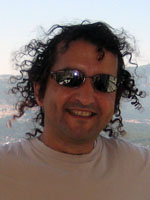By David Ogul
 JERUSALEM — The discussion was getting a bit heated, in a polite sort of way. But the point made by the newlywed Israeli who is a native of New Jersey has caused me to think about what it means to be a Jew in America and the challenges we face.
JERUSALEM — The discussion was getting a bit heated, in a polite sort of way. But the point made by the newlywed Israeli who is a native of New Jersey has caused me to think about what it means to be a Jew in America and the challenges we face.
I was invited by Rabbi Esther Israel, who taught a class I took at the Conservative Yeshiva, to join her and her family at a modern Orthodox synagogue for Shabbat services, followed by lunch at her home in the German Colony of Jerusalem. The services were held entirely in Hebrew, but I managed to keep up. Afterward, we all met up – in Orthodox synagogues, men and women are separated by a mechitzah – and walked to her modest home just a few blocks from where my wife and I stayed the last time we visited Jerusalem some 19 months ago.
Also joining us was a South African woman who made Aliyah a couple years ago, an Orthodox Jew who is looking to marry, have children and live in the land of Israel. And there was the woman fromNew Jersey, a writer who is involved in an ambitious documentary about the Palestinian conflict, and her husband, an Israeli professor who speaks seven languages.
Somewhere between the servings of salmon and tofu, I made the comment that I found it much easier to be a Jew in Jerusalem than in the States. In Jerusalem, everything shuts down on Shabbat. In Jerusalem, there are 50 shuls within walking distance – there is no need to drive. In Jerusalem, Jews are a majority; the observant don’t feel out of place wearing a kippa and talit katan. In the United States, I sometimes feel like I’m on another planet. And in Jerusalem, praying the required three times a day is routine.
My friend fromNew Jersey was unconvinced. Her message: Jews in America are lazy. She is embarrassed that they don’t take the time to learn Hebrew. Studying Torah and not knowing Hebrew, she said, was like kissing the bride while she’s wearing a veil. Translations are fine, she said. But why, she argued, doesn’t American Jewry spend its money on ensuring that its youth becomes fluent in Hebrew? Why, she argued, does it spend billions of dollars sending its children toIsrael on 10-day birthright trips, instead of ensuring that future generations are fluent in G-d’s chosen language?
It was a discussion that went back and forth. Neither of us was willing to give up any ground. And, in the name of full disclosure, I do not speak Hebrew. I understand the prayers, I read the translations of Torah, and while in Jerusalem I have been introduced to the study of the Mishna, but my Hebrew vocabulary consists of about 30 words.
But my new friend was insistent. Jews in America make a choice. They choose to live in a country that compromises its religious values. They choose to live in a country where they can earn more money, but give up something spiritually. They can decide to move toIsrael. They can decide to learn Hebrew. They can decide to put their children in Hebrew day schools. They can decide to live more modestly for the sake of their faith, but they opt not to.
Does that make me a lesser Jew? Does that make me less observant? Does that make me a second-class citizen? The hosts and other guests seemed a bit uneasy by the discord, and, in fact, the woman fromNew Jerseylater apologized, saying she didn’t mean her comments to be a personal attack.
I ended with this: The most moving part of the Shabbat service that morning, the part of the Shabbat service that brought me to tears, the part of the Shabbat service that clearly meant more to all of the 250 or so people that were there, was when we all sang “Etz Chayim” after putting the Torah away following the reading of Mattot (from the book of Deuteronomy). Etz Chayim describes the Torah as “a tree of life for those who grasp it, and those who uphold it are happy. Its ways are ways of pleasantness, and all its paths are peace.”
It is the same hymn sung in synagogues – regardless of denomination – across the world. And at that time, when we are all singing, we are all Jews. All equal. We all are descendants of those who stood at the base of Sinai when G-d gave Moses the Torah and Ten Commandments.
Amen.
*
Ogul is a freelance writer based in San Diego. He may be contacted at david.ogul@sdjewishworld.com